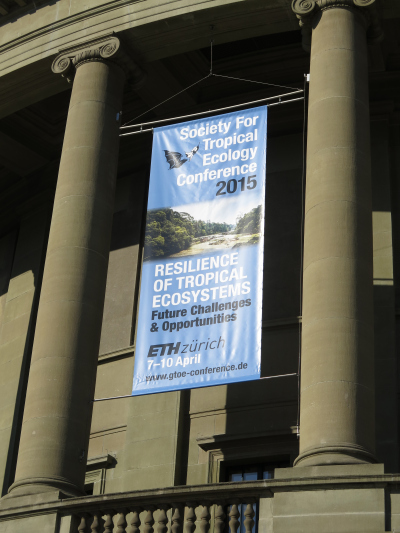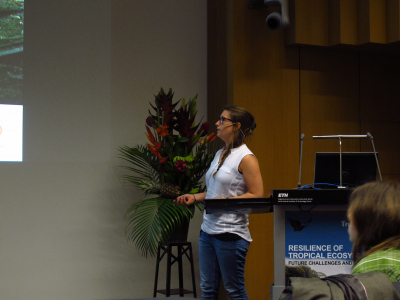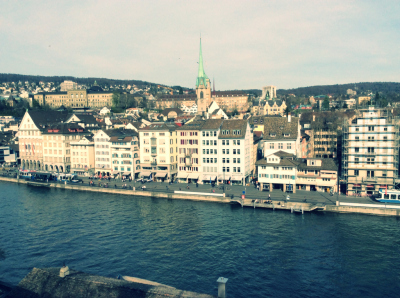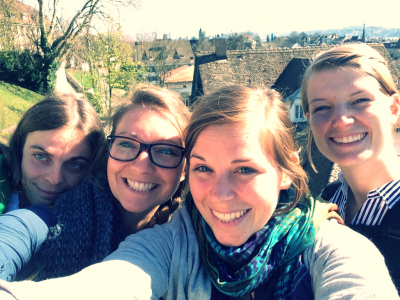Die Inhalte dieser Seite sind leider nicht auf Deutsch verfügbar.
Seitenpfad:
Amanda Ford
Report of GLOMAR PhD student Amanda Ford about her participation in the GTÖ annual conference in Zürich, Switzerland from 7 - 10 April 2015
The Swiss Federal Institute of Technology (ETH) in Zürich hosted the Annual Conference of the Society for Tropical Ecology (Gesellschaft für Tropenökologie, GTÖ) from the 7th-10th April. The conference was titled “Resilience of Tropical Ecosystems: Future challenges and opportunities”, and included 19 sessions ranging from coral reef ecology to tropical forests and agriculture. The conference primarily aimed to address tropical biodiversity, defining resilience of tropical ecosystems and novel approaches to both understanding and managing tropical ecosystems.
There was a range of interesting presentations, ranging from small management case studies to models describing worldwide biodiversity loss and ecosystem degradation. Many sessions which focused on functional diversity, ecosystem functioning, resilience concepts and community-based management were applicable across all ecosystems, and it was interesting to see the links between all the different fields of research and the need for inter-disciplinary approaches. The key notes were particularly inspiring, and included Professor Robin Chazdon who discussed resilience and stewardship, and described the complex adaptive systems approach, and Dr Toby Gardner who talked about his work focused in science-policy issues in human-modified tropical landscapes.
I had the opportunity to present results from the first study of my PhD in the session, “Resilience of Tropical Coral Reefs: Interdisciplinary Efforts for Meaningful Management Actions”. My presentation was titled; “Disentangling local and global drivers of Pacific Island coral reef degradation”. This study includes an analysis of a large-scale data-set from the Pacific with information of coral reef condition, fish biomass, fishing practices and characteristics of the local communities, and I have included metrics for thermal stress in order to assess which are the primary drivers of reef degradation, and how different drivers interact. Our session took place in the impressive Audi Max in the ETH building, which provided an incredible atmosphere for my first presentation at an international conference.
Overall, the conference was very motivating and valuable. It was great to broaden my perspective to other tropical ecosystems, as the ecology concepts are obviously very consistent, and both terrestrial and marine studies can learn from each other to improve future research and management. I left the conference feeling very inspired and having made some very useful contacts for future work. Furthermore, there were many positive messages from the conference regarding ecosystem management and how we can increase future resilience in the changing world, which was really encouraging and is often shadowed by the negative outlook. I would very much like to thank GLOMAR for their support, and for providing me with the opportunity to present my work at such a prestigious international conference.
There was a range of interesting presentations, ranging from small management case studies to models describing worldwide biodiversity loss and ecosystem degradation. Many sessions which focused on functional diversity, ecosystem functioning, resilience concepts and community-based management were applicable across all ecosystems, and it was interesting to see the links between all the different fields of research and the need for inter-disciplinary approaches. The key notes were particularly inspiring, and included Professor Robin Chazdon who discussed resilience and stewardship, and described the complex adaptive systems approach, and Dr Toby Gardner who talked about his work focused in science-policy issues in human-modified tropical landscapes.
I had the opportunity to present results from the first study of my PhD in the session, “Resilience of Tropical Coral Reefs: Interdisciplinary Efforts for Meaningful Management Actions”. My presentation was titled; “Disentangling local and global drivers of Pacific Island coral reef degradation”. This study includes an analysis of a large-scale data-set from the Pacific with information of coral reef condition, fish biomass, fishing practices and characteristics of the local communities, and I have included metrics for thermal stress in order to assess which are the primary drivers of reef degradation, and how different drivers interact. Our session took place in the impressive Audi Max in the ETH building, which provided an incredible atmosphere for my first presentation at an international conference.
Overall, the conference was very motivating and valuable. It was great to broaden my perspective to other tropical ecosystems, as the ecology concepts are obviously very consistent, and both terrestrial and marine studies can learn from each other to improve future research and management. I left the conference feeling very inspired and having made some very useful contacts for future work. Furthermore, there were many positive messages from the conference regarding ecosystem management and how we can increase future resilience in the changing world, which was really encouraging and is often shadowed by the negative outlook. I would very much like to thank GLOMAR for their support, and for providing me with the opportunity to present my work at such a prestigious international conference.
Enjoying sunny Zürich after the coral reef session (from left to right: Claudia Pogoreutz, Amanda Ford, Ines Stuhldreier, Pia Keglar)






